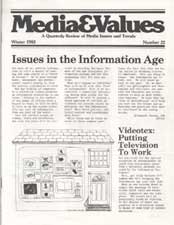Starting Point: Issues in the Information Age
|
This article originally appeared in Issue# 22
|
For most of us, getting information is still a matter of seeking out some expert or a "trusted friend." Or we pore through books, newspapers and professional reports hoping to find the precise information we need.
Now the linking of computers to a television screen promises an information revolution in our lives. Sitting in the comfort of our homes or offices with a keypad in hand, we will be able to call up on the screen literally any sort of information from any part of the world.
Like the initial stages of cinema, radio and television, the next ten years will be critical in deciding the basic formats of the new electronic information systems and how this technology will fit into our lives.
What will happen to libraries? What will we do with this flood of information? Will it be essentially a commercial advertising medium more useful for the affluent? Or will it present a broad spectrum of cultural enrichment and provide social opportunity for the information poor? What about privacy, editorial control and transborder data flows?
While there are no clear answers to these complex questions the fact that they are being raised in thinking circles is important. Only one thing is clear: the Information Age is here, now. We will never go back to the past. So, we must rally our philosophers and theologians and ethicists, our pastors and educators and social workers to help us walk boldly into tomorrow. We hope this edition of Media&Values will help you sort out the issues and understand the questions that must be considered in the coming decade.



